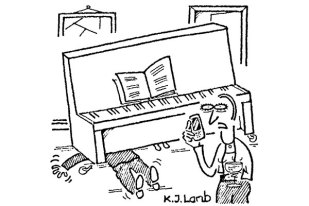With more than a dozen acclaimed novels to her name, not to mention short stories, poetry, a memoir and a Booker nomination, you might think that Michèle Roberts could have counted on being published for life. But as so many ‘established’ authors know painfully well, in that ever-hungry-for-the-new world there’s no such thing as tenure.
So when her latest novel elicits a lack-lustre response from her agent before being ‘sweetly’ but flatly turned down by her publisher, a stunned Roberts finds herself processing the humiliation in the only way she knows how — by writing about it. ‘My past successes counted for nothing,’ she mournfully observes: ‘There was only this smashed-up present.’ Still, ever the creator, she can’t help wondering whether she mightn’t be able to make something out of the ‘destroyed pieces’ of herself.

The something is this book, and what a thing it is: brave, naked, defiant and exquisitely written. What could so easily have become a score-settling whingefest instead takes flight and turns into a touching and joyously clear-eyed account of what it means to be an artist.
Not that it’s just about writing — far from it. Nature, food, romantic love, loss, the slippery world of the imagination and the enduring and restorative nature of friendship are among its themes. As Roberts flits between her basement flat in London and her ramshackle house in Mayenne, her canvas feels as swoopingly vast as her palette is luscious and bright.
I admit I did initially wonder whether each piece of the patchwork was going to earn its keep. Did I really need to be reminded of what it feels like to stand in the vegetable aisle in Morrison’s? And could I find it in myself to care — as Roberts and a friend head to Paris for the Bonnard exhibition — about the irritatingly late handover of the keys to an Airbnb?
It turns out I could, every single time, because a style that at first feels slapdash, even rambling, soon develops a heady, pointillist beauty. Trust the writer, and the whole picture slides into view. A hare seen ‘loping along’, as Roberts lolls on her French doorstep, feels like a sudden, mysterious blessing, coming as it does after a description of her ‘grey-faced’ neighbour revealing that his 20-year-old son has killed himself. Similarly, an urge to coat the clematis-gnawing squirrels — ‘slimy beasts’ — in seasoned crumbs, drop them in boiling fat and serve them garnished with parsley, leads logically — don’t ask how — to an all-too-vivid anecdote about Roberts’s parents enjoying post-prandial sex behind a bush in a friend’s riverside garden. Meanwhile, an entrancing 15-page description of a visit to a local market becomes entwined with an urgent meditation on the nature of female orgasm, before ending with a sly description of the melancholy ‘bio’ market stallholder who ‘fingered two heads of garlic towards me’.
A publisher admitted ‘she’d only read about half the novel, and didn’t know when she’d have time to finish it’
Laced through it all there’s the agony of endless waiting — ‘like being a starving baby howling for food that never came’ — as Roberts hopes for a verdict on the latest re-draft of her novel. You don’t have to be a writer to wince on her behalf at the publisher who admits ‘she’d only read about half of the novel so far and she didn’t know when she’d have time to finish it’. Or, as Roberts goes on the ever more dispiriting search for new representation, the agent who observes that ‘it’s always harder once you’ve had five or six novels published. (Thirteen, actually, I wanted to snarl).’ Or the well-meaning relative who wants to know if she’s still writing? ‘Of course I’m still fucking writing!’ Roberts replies.
In the end — and what makes the book feel universal as well as personal — what it’s really all about is a crisis of self. Realising that her identity as a writer has sustained her since adolescence, Roberts struggles to come to terms with the fact that she may simply have to ‘let go of that persona’. It’s a genuinely frightening thought, and I don’t know a single author who wouldn’t feel a shiver go through them. But then again, ‘not all writers admit to failing’, as Roberts astutely points out. That something so downright beautiful and constructive can be pulled from all the humiliation and chaos is a lesson to us all.







Comments